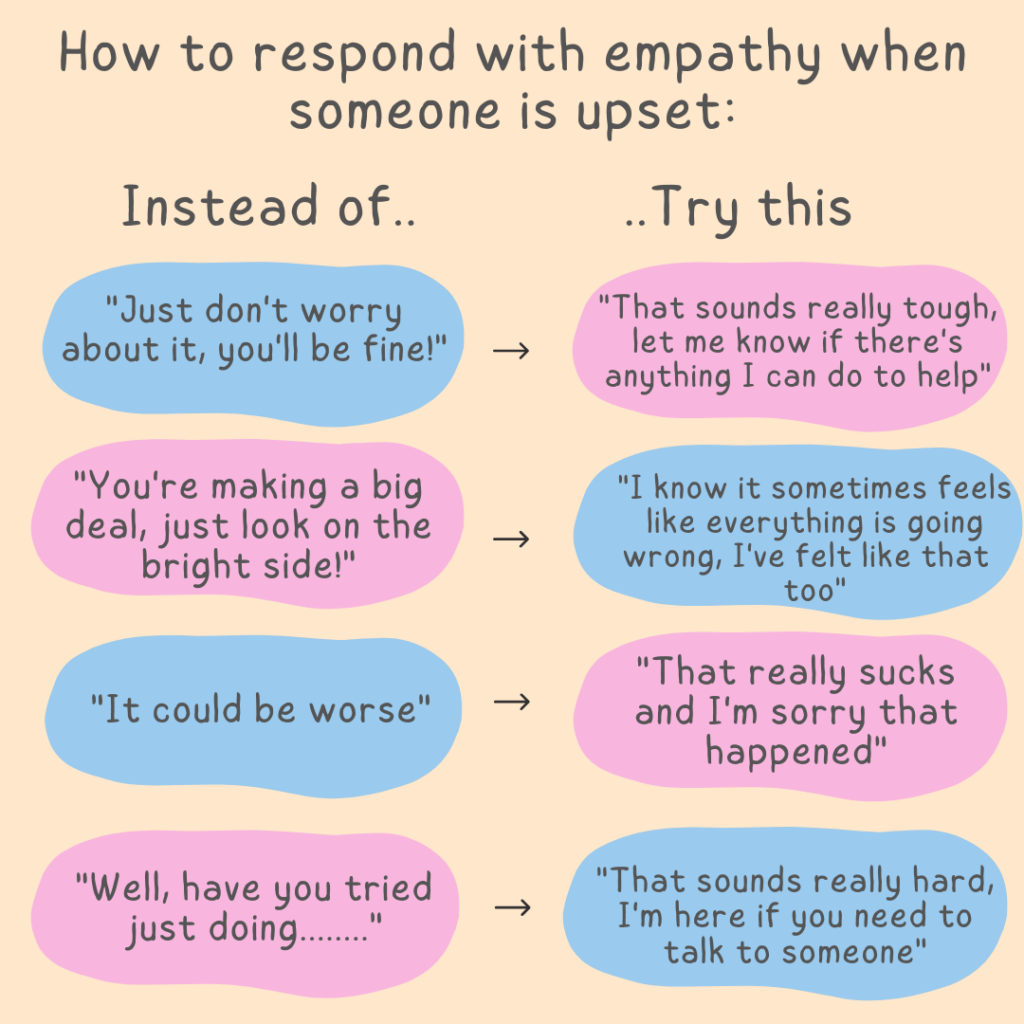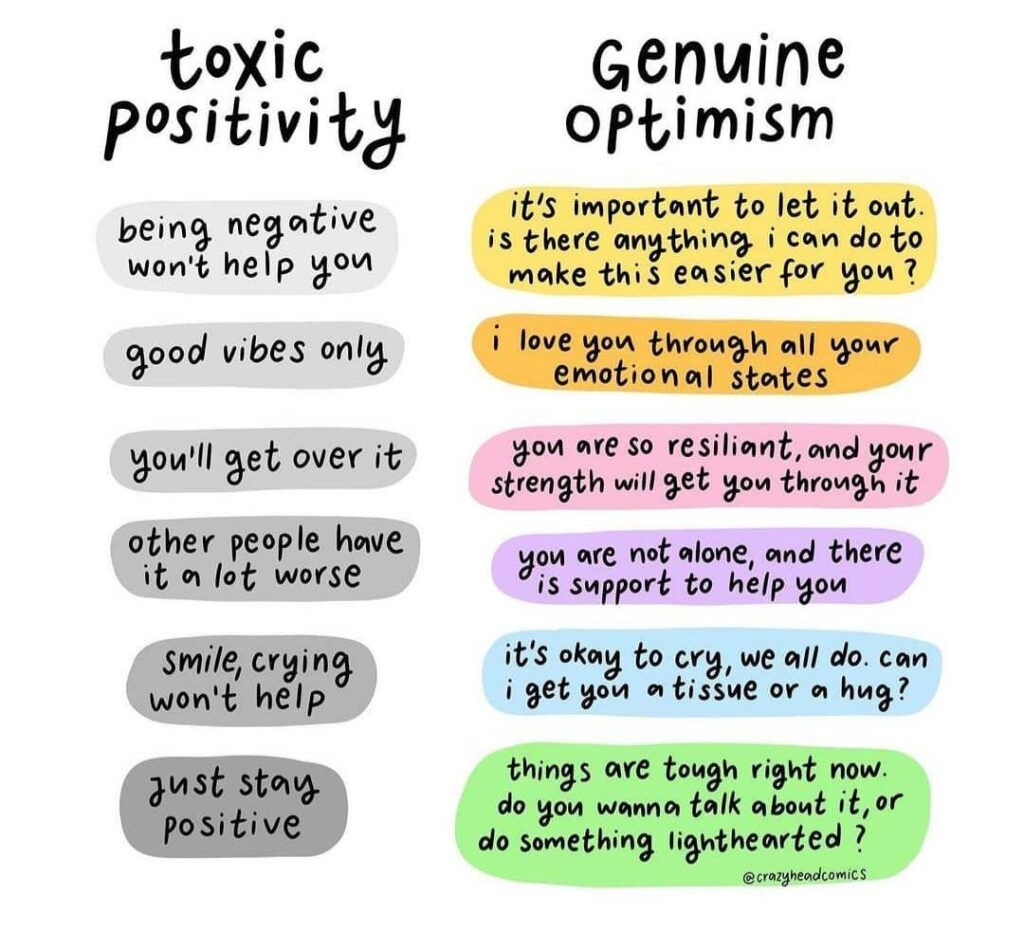When someone is struggling, it is really important to listen to them, so they feel less alone. You might not have a solution for their problems, but spending time listening to a friend is more important than saying ‘all the right things’. Taking time to try and understand your friend will show that you care.
Ideas for starting a conversation with a struggling friend
- “Is there something bothering you?”
- “I am sorry things are so hard right now. What has happened?”
- “I noticed that you’ve been struggling with ________. Do you want to hang out or play a game together?”
- “It looked like you were upset earlier. Is it OK for me to ask what made you feel that way?”
What you could say to show you care
- “I’m sorry you are going through this.”
- “Ahh, that sucks.”
- “Wow. I don’t know what to say.”
- “It makes me sad to hear this happened.”
- “I don’t know what to say but I’m here for you”
- “I’m happy to listen at any time”
Show interest/ dig deeper
Sometimes people say listening is about reflecting back what someone has said, but people usually feel more listened to when you show an interest in what they are saying and that you are trying to understand why they are struggling. You could ask things like:
- “How has that made you feel?”
- “What makes you say that?”
- “Is there anything else that is bothering you?”
- “So what you’re saying is…”
- “What happened after…?”
- “Why do you think this happened?”
- “Is there anything/ something else that is bothering you?”
Sharing Stories
You could share a story of a time when you have been through something similar, if you have one, or tell them if you know of other people who have experienced similar things. This can be another helpful way for people to feel less alone. While a lot of autistic people value stories like this, non-autistic people sometimes do not like this as they can feel you are taking attention away from them.
It can be really helpful to ask a friend what they need from you. Some people may just want sympathetic words, some people just want you to listen, some want you to show you understand and some people may want you to help them find a solution.
IMPORTANT MESSAGE:
IS YOUR FRIEND IN ANY SORT OF DANGER OR RISK OF HARM?
If the answer is yes to this, you need to either inform a trusted adult, or support your friend to tell a trusted adult of their own. Although you might not want to break the trust of your friend, it is always more important to make sure they can be kept safe if they are at risk of some kind of harm.
Top tips when you are listening to someone:
DO
- Try to understand their perspective, and show you are trying by asking questions that show you are thinking about what they have said and would like to understand more. Focus on being curious and understanding the “why”.
- Try not to judge them. Even if you feel they are in the wrong, now is not a good time to tell them that.
- Let them talk about why they are struggling. Just talking to a friend can help someone feel better.
- Take their thoughts and feelings seriously, even if you think they are joking/ it isn’t serious. They may sound like they are joking, even if they are not.
- Allow them to express their feelings in whatever way works for them. This may involve crying, screaming and more. Let them know that you understand how they are feeling.
DON’T
- Offer solutions or judgements. Focus on giving the person a chance to be heard. (Unless your friend has asked for solutions!)
- Say “things will get better”. At this moment, they need time and space for their pain to be seen/ heard.
- Don’t deny people’s experience. Even if what they are saying isn’t factual, denying it will not help because their feelings are still real.
- Try and fill in the blanks.


What next?
After speaking with a friend when they are struggling, it can be really hard to know what to do next. So here are 5 things you can do:
1) Continue listening
If they’re finding it difficult to talk, that is OK too. Can you let them know you’re there when they’re ready? Use the listening tips from above to support them in the best possible way.
2) Ask them what would help, or offer to help if you can
Often, listening is more than enough, but there may be little things you can do or say to help:
- “What do you need right now?”
- “What are you hoping for?”
- “I would like to do _____ for you. Is that OK?”
3) Do things you enjoy together
Can you keep inviting them to do the things you usually do, and encourage the people around them to do the same? Doing your normal things together can be really helpful.
4) Check in with them
It’s OK to not know what to say or do, but it is nice to know someone is there. Maybe get in touch regularly to check in. This includes continuing to message, even if they don’t always respond.
5) Know it’s not all on you
If someone tells you they are struggling, you may feel it is your responsibility alone to help. But you have done a lot already by being someone they can open up to.
Looking after your own well-being will make it easier to support someone else, so remember to reach out for support for yourself.
It is OK to acknowledge if supporting a friend is too much. This isn’t a failure. There are people who are trained as specialists to help when people are struggling.
Here are some people you could signpost a friend to:
- A staff member, if you are friends from a school, youth club or other activity
- Childline is open 24/7 and you can talk to a Childline Counsellor over the phone, email or live chat. Visit http://childline.org.uk/ or call 0800 1111
- Hopeline is open 9am-midnight every day and is aimed at preventing young suicide and you can speak to them on the phone or over email. Visit http://papyrus-uk.org/hopelineuk or call 0800 068 41 41
- Kooth offers emotional and mental health support via a website and an app. You can speak anonymously to other young people or a counsellor: http://kooth.com/
- In emergencies, you should always phone 999 immediately



